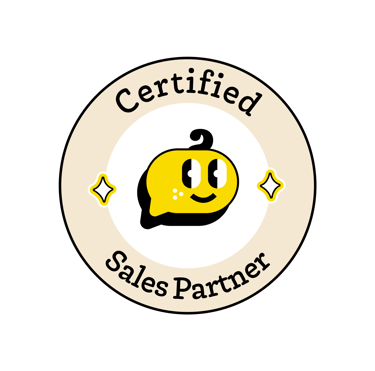AI Adoption and Upskilling
Why AI implementation of AI is most successful with the participatory approach.
Maaria Tiensivu
8/21/20257 min read
AI Adoption & Upskilling
Artificial intelligence has firmly established itself as a transformative force in the business world of 2025. What began as experimental technology has evolved into a critical competitive differentiator across industries. According to McKinsey's latest research, 78% of organizations now use AI in at least one business function, up from 72% in previous years. The enthusiasm is palpable - 92% of companies plan to increase their AI investments over the next three years.
Yet despite this widespread adoption and optimism, a striking paradox exists: only 1% of business leaders describe their AI deployments as "mature," meaning AI is fully integrated into workflows and driving substantial business outcomes. This gap between investment and maturity highlights the complex challenges organizations face in their AI journeys.
Key Challenges to AI Adoption: Why Organizations Struggle
Despite significant investments and clear intentions, organizations face several critical barriers to successful AI implementation:
1. Data Quality and Bias Issues
Poor data quality remains one of the most widespread challenges in enterprise AI adoption. According to Stack AI's research, nearly half of organizations surveyed in late 2024 reported concerns about AI accuracy and bias as a top barrier to adoption. For enterprises, poor data quality isn't just a technical issue, it's a business and ethical concern.
Biased AI recommendations could lead to unequal treatment of customers, skewed hiring decisions, or faulty risk assessments, all of which can damage a company's reputation and invite unnecessary regulatory scrutiny.
2. Talent Shortage and Skill Gaps
Implementing AI at enterprise scale requires specialized skills, and currently, there is a global talent shortage in AI and machine learning expertise. The fast pace of AI innovation often widens this gap, as even seasoned tech teams may not have experience with the latest frameworks or model architectures.
3. Integration with Legacy Systems
Even when an organization develops a promising AI model or pilot system, a major challenge lies in integrating that AI into the existing enterprise environment. Over 85% of tech leaders say they would need to upgrade or modify their existing infrastructure to deploy AI at scale. Integration complexity is a key roadblock that prevents AI solutions from scaling beyond isolated experiments.
4. Unclear ROI and Business Case
Despite the hype, many enterprises still struggle to clearly quantify the return on investment from AI initiatives. Several factors contribute to this challenge. Some AI projects are pursued because of the technology's novelty rather than alignment with business strategy. In other cases, benefits such as improved decision quality or process optimization may not be immediately measurable in financial terms.
5. Organizational Resistance
The final and arguably most human challenge is organizational resistance to AI adoption. Even if all the technical pieces are in place, an AI initiative can falter if the people in the organization are not on board. According to industry insights, only about one-third of companies in late 2024 said they were prioritizing change management and training as part of their AI rollouts.
A common scenario is the "pilot that never gets adopted." A team builds a capable AI tool, but after launch, employees simply don't use it consistently. This can cause AI projects to fizzle out, not because of technical failure, but due to human factors.
The Domain Expert Advantage: Why Specialists Are Critical to AI Success
While the challenges to AI adoption are significant, one approach has consistently demonstrated superior results: involving domain experts in the development and implementation of AI solutions.
The Power of Domain Knowledge
Domain experts bring invaluable context and understanding to AI projects. According to Master of Code Global's research, 86% of domain leaders plan to allocate at least half of their future AI budgets to the technology, compared to 67% of their peers. This commitment stems from their deeper understanding of how AI can address specific business challenges.
The statistics are compelling:
76% of domain experts report strong alignment between their AI initiatives and business goals, 9% higher than other organizations
69% of domain expert executives use AI for a minimum of 50% of their major functions, 36% more than their competitors
50% of domain-led organizations have 10+ use cases in production, 31% more than other enterprises
"It is in the collaboration between people and algorithms that incredible scientific progress lies over the next few decades."
- Demis Hassabis, cofounder and CEO of Google DeepMind
Why Domain Experts Succeed Where Others Fail
Domain experts excel at AI implementation for several key reasons:
Contextual Understanding: They understand the nuances and complexities of their field, allowing them to identify high-value use cases that might be overlooked by technical teams working in isolation.
Problem Definition: They can precisely define problems in ways that make them solvable through AI, focusing on issues that will deliver meaningful business impact.
Data Interpretation: They can better interpret the outputs of AI systems, recognizing when results make sense within their domain context and when they don't.
User Adoption: They understand the workflows and needs of end-users, making them invaluable for designing AI solutions that will actually be used.
Ethical Considerations: They can identify potential biases or ethical concerns specific to their domain that might not be apparent to technical teams.
The challenge lies in domain experts being experts within their domain, not in AI or innovation. This is why skilled facilitation is required to lead projects to successful outcomes.
Within a skilled process the domain experts learn the process of problem solving with and for AI, as well as become comfortable enough with the tools to help share them with others in the organization.
Personalized AI: The Path Forward for Successful Implementation
The most effective approach to AI adoption combines the technical capabilities of AI with the specialized knowledge of domain experts to create personalized AI solutions tailored to specific business contexts.
The Rise of Vertical and Modular AI
According to Capgemini's 2025 predictions, one of the key trends shaping the AI landscape is the rise of vertical AI - domain-specific applications fine-tuned for particular industries or functions. Businesses are shifting from off-the-shelf models to customized solutions for legal, healthcare, finance, or retail.
Master of Code Global notes that custom modules, test-driven prompt engineering, and mixed-model strategies (e.g., ChatGPT + Claude + Gemini) are increasingly defining enterprise usage. This approach allows organizations to leverage the strengths of different AI models while tailoring them to specific domain requirements.
Hyper-Personalization at Scale
Generative AI solutions are evolving from generic assistants into highly customized teammates. From voice-matching assistants to tailored learning and marketing experiences, 2025 is seeing a sharp rise in tools that adapt in real-time to individual preferences, behaviors, and tones of voice.
This personalization extends to how AI is implemented within organizations. Rather than one-size-fits-all solutions, successful companies are creating AI tools that reflect the specific needs, language, and workflows of different departments and roles.
The Human-AI Partnership
The most successful AI implementations recognize that AI is not about replacing human expertise but augmenting it. McKinsey's research shows that employees are more ready for AI than their leaders imagine. They are more familiar with AI tools, want more support and training, and are more likely to believe AI will replace at least a third of their work in the near future.
By involving domain experts in the development and deployment of AI, organizations can create solutions that enhance human capabilities rather than attempting to replace them. This collaborative approach leads to higher adoption rates and better business outcomes.
Implementation Strategies: Collaborative Approaches to AI Adoption
Successfully implementing personalized AI with domain expert involvement requires structured approaches that facilitate collaboration between technical teams and business experts.
AI Sprints: Accelerating Development and Adoption
One effective methodology gaining traction is the AI Sprint approach, as exemplified by KNOW-ME's AI Sprints. This 5-step process brings AI to organizations through their people:
Pick Your Problem: Identify where AI can make the biggest impact based on your team's expertise and business needs.
Explore Options: Evaluate different AI approaches and solutions that could address the identified problem.
Build Your Solutions: Develop AI tools tailored to specific needs, with domain experts guiding the process.
Test with Humans: Validate solutions with actual users to ensure they meet real-world requirements.
Pilot to Scale: Move from successful pilots to organization-wide implementation.
This sprint methodology delivers several key benefits:
It creates AI solutions that are ready to implement and scale throughout the organization
It can be used for team-facing as well as customer facing challenges alike
It empowers domain experts to solve their organization's biggest problems, as well as enhance the quality and speed of their specialist work
It provides hands-on experience that builds AI literacy across the organization and help others in the organization implement their own AI tools
It creates buy-in through being included in the process in practice
Creating AI Champions Within Organizations
Another successful strategy is identifying and empowering AI champions within different departments. By tapping into this enthusiasm and expertise (instead of just seniority when selecting Sprint participants) organizations can create a network of internal advocates who can help drive adoption across different domains.
Federated Governance Models
As organizations scale their AI initiatives, they need governance models that balance central oversight with domain-specific flexibility. McKinsey recommends federated governance approaches where:
Leaders directly oversee high-risk or high-visibility issues, such as setting policies and processes to monitor models for fairness, safety, and explainability
Domain experts and business units handle performance-based criteria such as accuracy, speed, and scalability for their specific applications
This balanced approach ensures consistent standards while allowing for domain-specific customization. After all, only a lawyer can truly assess the quality of a legal draft output, and the same goes for every area of expertise.
Conclusion: The Path Forward
As we navigate the AI landscape of 2025, it's clear that the most successful organizations will be those that combine cutting-edge AI technology with deep domain expertise. The challenges of AI adoption (from data quality and talent shortages to integration issues and organizational resistance) are significant but possible to tackle with the right approach.
By embracing personalized AI solutions co-created with domain experts, organizations can move beyond the pilot trap that has already archived many good AI initiatives. By organically facilitating the AI adoption process through upskilling teams in both AI and problem solving can develop AI tools that deliver real business value, are readily adopted by employees, and scale effectively across the enterprise.
The statistics tell a compelling story: domain-led AI initiatives consistently outperform their counterparts in alignment with business goals, breadth of implementation, and number of production use cases. As AI continues to evolve, this collaborative approach will become even more critical to success.
For organizations looking to accelerate their AI journey, the path forward is clear: invest in your domain experts, involve them deeply in AI development and implementation, and create personalized solutions that reflect the unique needs and challenges of your business.
The future of AI isn't just about better algorithms, it's about better collaboration between human expertise and artificial intelligence. And who better to lead that change than the incredible experts within your team.
Written by: Maaria Tiensivu
Founder of KNOW-ME




We're ready when you are.
Book a call with our team to get started on your project today.
Read our Privacy Policy.
© 2025. KNOW-ME by Innovation Distributed Oü All rights reserved.
Or check out our offerings
The AI Officer – When you want to run the best fish market 👈
AI Solutions – When you want to buy & sell the fish 👈
AI Training – When you want to learn how to fish👈
*Our apologies, we don't actually sell fish, but we do sell AI Agents, AI Training, and AI Governance Services.






